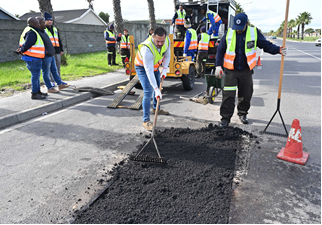Cape Town Steps Up Winter Pothole Repairs Amid Flooding in Key Suburbs
Beyond potholes, localized flooding has become a growing concern in several low-lying areas, exacerbated by blocked stormwater drains and illegal dumping.

- Country:
- South Africa
As persistent winter rains continue to wreak havoc on the Mother City’s roads, officials from the City of Cape Town’s Roads Infrastructure Management team have ramped up efforts to carry out temporary pothole repairs in heavily affected areas, including Gugulethu, Manenberg, and Newlands. These interventions aim to maintain road safety and prevent accidents while longer-term solutions are held off until drier conditions return.
The ongoing work is part of the City's winter road maintenance strategy, which utilizes cold mix asphalt for temporary fixes until hot mix asphalt can be used for permanent repairs during the warmer, drier summer months.
The Science Behind Seasonal Potholes
Explaining the impact of cold, wet weather on road infrastructure, Mayoral Committee Member for Urban Mobility, Councillor Rob Quintas, said:
“During winter, and as a result of heavy and ongoing rains, water seeps into cracks on the road surface. These cracks widen, and turn into potholes that damage tyres and cause accidents.”
Quintas joined city workers in the field this week to oversee operations and engage directly with teams managing the emergency interventions. He noted that cold mix asphalt, while a temporary measure, is critical in preventing further road degradation during the rainy season.
Summer Strategy: Monitoring and Permanent Repairs
The city has confirmed that all areas receiving cold mix repairs this winter will be revisited during the summer months. The goal is to monitor the durability and effectiveness of temporary patches and then replace or reinforce them using hot mix asphalt, which offers superior bonding and long-term resilience.
“In summer, we will return to monitor the performance of the cold mix and do permanent repairs with hot mix asphalt, where needed,” added Quintas.
Drainage Challenges: Dumping and Greywater Escalate Flood Risk
Beyond potholes, localized flooding has become a growing concern in several low-lying areas, exacerbated by blocked stormwater drains and illegal dumping. The city’s teams, while addressing road surface damage, have also found flooding intensified by irresponsible disposal of waste.
In Gugulethu and Manenberg, excessive mountain run-off compounded by residents dumping furniture and household waste into storm drains has made the situation worse. Additionally, the illegal discharge of greywater (wastewater from household chores) is emerging as a major culprit behind road damage and accelerated pothole formation.
“Greywater contains chemicals from laundry, bathing, dishwashing and car washing. These chemicals weaken road surfaces over time,” explained Quintas.
A Call to Action: Public Cooperation Essential
The City of Cape Town is urging residents to do their part in maintaining infrastructure by adopting more responsible habits:
-
Do not dump waste into stormwater drains — this clogs the drainage network and worsens flooding.
-
Dispose of greywater responsibly — use proper connections to the municipal sewer system, where the water can be treated and re-used.
-
Report road damage or flooding via:
-
City Call Centre: 0860 103 089
-
City of Cape Town App
-
“Our teams are working hard to clear blocked drains and keep roads safe this winter, but we need your help,” Quintas emphasized. “Together, we can reduce winter flooding and prevent the forming of new potholes.”
Community Impact and Next Steps
The city’s proactive efforts are part of a broader commitment to urban mobility and infrastructure resilience under increasingly volatile weather patterns. Cape Town’s winter maintenance strategy not only aims to minimize immediate road safety hazards, but also seeks to build a data-driven, climate-responsive approach to urban infrastructure management.
City engineers continue to survey flood-prone areas and adjust operations in real time based on weather forecasts, traffic patterns, and citizen reports. The administration has also begun exploring long-term drainage improvement projects and public education campaigns focused on urban water stewardship.
A Collaborative Path to Resilient Infrastructure
As South Africa’s cities grapple with the dual challenges of aging infrastructure and climate variability, Cape Town’s strategy stands out for its emphasis on adaptive maintenance, public participation, and cross-seasonal planning. The winter pothole programme—though temporary—is a testament to the city's responsiveness and resilience in safeguarding its roads and communities.










